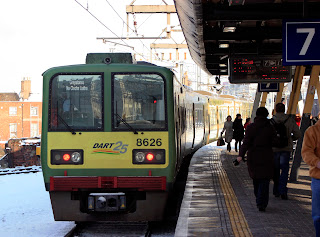BY B. SIEJA, H. KUBO
To begin with, make sure that study comes first. Do not forget that
you are in the university and you have to adapt to new environment. It is
beneficial that you learn new academic skills to keep up with classes and
exams. DCU provides you with various academic workshops. Here is a list that
might interest you:
The NuBar is a social outlet in The Hub where students can enjoy food
and beverages, chatting with friends, listening to music or playing billiards.
It also hosts some official DCU events. For example, last year the Inter Faith
Centre organised a Christmas party for international students at the NuBar.
Turning twenty one opens up a new world for you. Now you have to
learn how to balance work and play. Dublin City University just celebrated its
21st birthday and is one of the youngest universities in Ireland. As such, it
offers lots of events and entertainment. There is something for everyone,
particularly newly arrived international students, allowing you to both study
and socialise.
Academic life
 |
| NuBar in The Hub by B. Vysoky |
- Note-taking Lectures
- Introduction to Reading Techniques
- Academic Writing for Assignments
- Coping with Culture Shock
- Working in Groups
- Time Management
- Presentation skills
- Managing Stress, Focus & Energy for Exam Performances
 |
| DCU Library by B. Vysoky |
Workshops usually take up to two hours to complete and are presented
in a relaxed and friendly way. For example, in the ‘Working in Groups’ workshop you will be
practising how to cooperate with your peers, talk about your ideas, propose new
plans, etc. Training includes simulations of working on a group project. Also, you get handouts and notes for
free!
We attended some of the workshops and what we have learned
helped us in our studies and private lives. Skills such as effective time
management, verbal and written communication and team work can also be practical
to your future workplace. If you want to find out more, go to “Academic and Study Skills Support” on DCU homepage.
Social life
So what can hard working students do with their free time? They can
participate in many of the exciting events that happen in DCU. In this article
we list some of these events focusing on The Hub and The Helix. These
facilities can be enjoyed by all DCU students regardless of membership of clubs
and societies.
Events in the NuBar
 |
| Inside NuBar by B. Vysoky |
Every Tuesday is Toxic Tuesday at the NuBar. Drinks are available at
discount prices and DJ's play the latest hot club sounds. This could be a good
opportunity for stress management and utilising your communication skills. This
is one of the most popular events during the semester.
The Music Society in DCU hosts Open-mic events at The Venue. You can
enjoy this particular event as an audience member or participant if you wish.
They provide some of the instruments and all you have to do is give your name
and your chosen instrument before the event starts.
Every once in a while the NuBar offers free food for students and soft
drinks at discount prices. You would be advised to get there early because the
free food is limited and offered on a 'first come-first served' basis.
These and other events can be discovered on GreatCraic.ie
which is the official DCU social website.
Events in The Helix
 |
| The Helix by B. Vysoky |
The Helix is a state of the art theatre on the grounds of DCU. It
has three performance spaces which are used by student societies and
professional touring companies alike.
You can enjoy various art forms including drama, dance, film, and
pantomime. The Helix also hosts guest lecturers from around the world. During
the day its warm cosy atmosphere attracts students and staff. Students meet
there to discuss their group projects and to socialise. At night you can attend
dance recitals, live music shows, dramatic performances, old movie classics or
the annual panto.
Dance recitals can be anything from hip-hop to ballet to Irish
dancing. Second Age Theatre Company is well known for staging their
Shakespearean productions here. Live music shows at The Helix include
Orchestral, Gospel, Rock, and Pop. It is also the venue for RTE's talent show
The Voice of Ireland which is a competition to win a recording contract with
Universal Music. Tickets prices for all these events vary so check their website for regular updates.
DCU provides us with all the social and academic events we need in
order to have a balanced college experience. Enjoy!


























